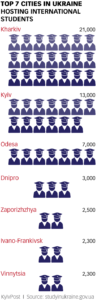Nigara Hamrayeva of Turkmenistan, a law student at Taras Shevchenko University of Kyiv, had an unusual reason to come to study in Ukraine.
“I really liked a poem by Taras Shevchenko, so I wanted to come to Ukraine,” the 25-year old student recalls. “The country has a very rich and interesting history.”
Hamrayeva is one of 64,000 international students currently studying at Ukrainian universities.
Despite war and economic uncertainty, international students flood into Ukraine every year. The appeal? A cheap education, for starters. Even the usually pricey medical schools in Ukraine cost students only from $3,000 to $5,000 per year.
But money isn’t the whole story, according to Olena Shapovalova, the director of Ukrainian State Center for International Education.
“Most international students choose medical and technical degrees, where the quality of teaching is very high,” Shapovalova says.
International students from Taras Shevchenko University of Kyiv speak to the Kyiv Post on Jan. 12. (Anna Yakutenko)
Another international student, 19-year old Ukrainian language student Daniele Andenov from Italy, says it is the prospect of living in a capital, among other factors, that made him want to study in one of Ukraine’s leading universities, Shevchenko University of Kyiv.
“Kyiv is very lively. There are a lot of people, a lot of opportunities,” he says.
In 2016, the top providers of foreign students to Ukrainian universities were Azerbaijan, Turkmenistan, India, Nigeria, Morocco, Georgia, Jordan, Iraq, China and Uzbekistan.
Taweh Johnson, a 23-year-old information technology student from Liberia, prides himself in being the first Liberian to study in Shevchenko University.
He had to seek education in Ukraine because his country’s infrastructure, including the educational system, is struggling after the several years of war.
“It’s my hope that I’ll make the best use of this opportunity,” Johnson said.
Growing demand

Top 7 cities in Ukraine hosting international students. (Stella Shabliovska)
The number of foreign students is growing: Some 27,000 new students arrived in 2016, compared to 19,000 students in 2015.
Lately, according to Shapovalova, Ukraine’s colleges have been especially popular with Indian and Moroccan students, while the numbers of students from post-Soviet countries, including Turkmenistan and Azerbaijan, have decreased. She expects a rise in the number of students from Asia and Africa.
Some of the arriving students are surprised with what they find.
“Before I came people told me it’s a racist country, (there is a) war and it’s unstable…” Johnson from Liberia told the Kyiv Post. “I saw the complete opposite: people are friendly, receptive and responsive. They are always willing to give you directions and help you out.”
Shapovalova notes that safety is a popular concern among prospective students. Ukraine’s embassies abroad have to put efforts into explaining that the cities offering international education aren’t affected by the war.
Kharkiv, Ukraine’s second biggest city, in the east of the country, which has been offering degrees to foreigners for many decades, remains the most popular city in Ukraine for international students, with almost 21,000 studying there at the moment.
The second biggest host city is Kyiv, with 13,000 international students. The rest study in Odesa, Dnipro, Zaporizhzhya, Ivano-Frankivsk, Vinnytsia, and other cities.
How to apply
There are a few options for applying to study in Ukraine. Foreign students have two application deadlines: Nov. 1 (Ukrainian students start on Sept. 1) and March 1.
“This was done by the Ministry of Education because in some countries students receive academic certificates quite late, or don’t get to find out whether they’ve been given an offer for a long time,” Shapovalova explains.
Foreign students can choose between studying in Ukrainian, Russian, or English.
Those who wish to study in Ukrainian usually attend a one-year Ukrainian language course to achieve the required fluency before they can start classes with other Ukrainians. The English-language students study in separate groups.
Students can apply directly to a university or via an agency, which, for a relatively small fee, can offer help in finding the right course and university, as well as helping with the application process and obtaining a visa.
Johnson from Liberia found enrollment very easy. He applied via the Ukrainian State Center for International Education and provided scanned documents from his high school. He said there were no exams to get admission.
“You can get a world-class education while paying an affordable amount. The cost of student living in Kyiv is also very reasonable,” Johnson says.
Shapovalova claims that many students return what they spend on Ukrainian education in their first year with the jobs they find in their home countries after graduation.
“These graduates are also good cultural ambassadors for Ukraine abroad,” she said. “And that, in times of information aggression from Russia, is very important.”
